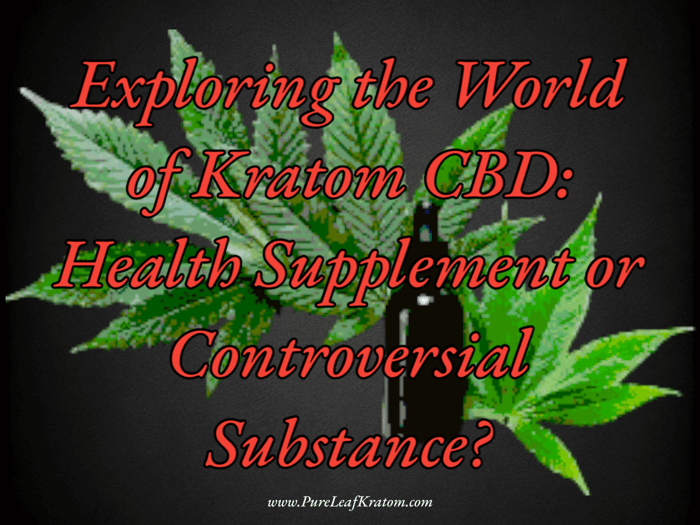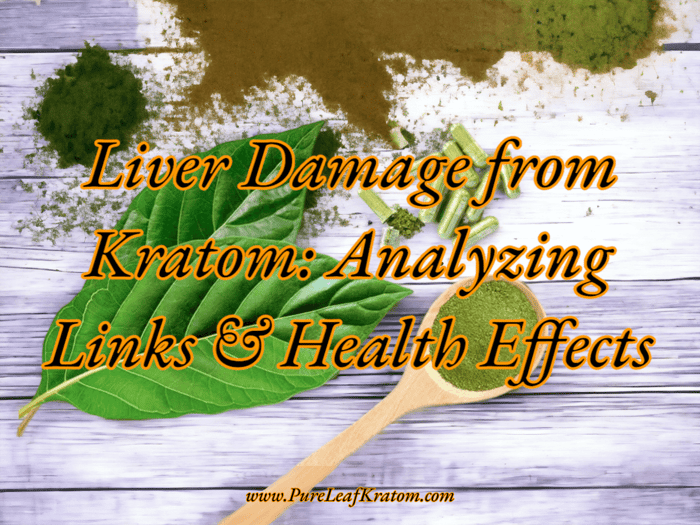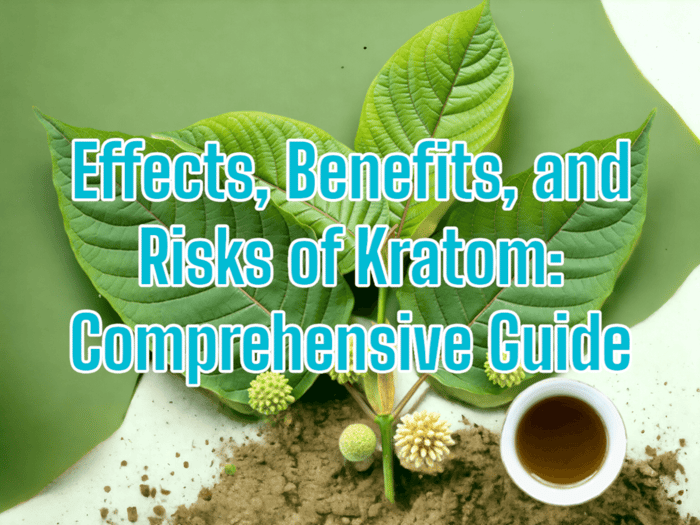
Exploring the World of Kratom CBD: Health Supplement or Controversial Substance?
Unveiling the World of Kratom CBD
Delving into the world of natural health supplements, we often find ourselves wandering in the realms of scientific jargon, alternative remedies, and sometimes, controversy. One such compound is Kratom CBD, a substance that's been gaining traction not only for its potential health benefits but also for the debates encompassing its use.
Simply put, Kratom CBD is an intriguing interplay between the worlds of traditional herbal medicine and modern science. It brings together kratom – a herb native to Southeast Asia, known scientifically as Mitragyna speciosa, and CBD – otherwise known as cannabidiol, a naturally occurring compound found in the Cannabis sativa plant. The result? An innovative health supplement steadily paving its way through the alternative medicine landscape. But how effective is it? And what debates does this fusion stir?
The Multifaceted Discussion Around Kratom CBD
When it comes to Kratom CBD, the discourse is as diverse as it is fascinating. To some, it's a much-needed respite from chronic pain or a beacon of hope in the quest for anxiety relief. To others, it's one side of a double-edged sword, hiding potential risks beneath its layer of benefits.
The road to understanding this potent substance involves delving into its botanical roots, analyzing the health claims surrounding it, and confronting the controversies that color its global image. In the following sections, we will traverse from the tropical rainforests where Kratom grows, through the complex extraction and processing methods for producing Kratom CBD, onto the potential benefits and uses of this supplement, culminating in an examination of the brewing debates about its role in alternative medicine.
Whether you're a health enthusiast, a natural remedy devotee, or a skeptic pondering the safety and efficacy of Kratom CBD, this thorough exploration will provide you with a comprehensive understanding of this fascinating substance.
The Origin and Composition of Kratom CBD
A Detailed look into the Mitragyna Speciosa Plant
The Mitragyna Speciosa, more commonly known as the Kratom tree, is a tropical evergreen tree native to Southeast Asia, specifically regions of Thailand, Indonesia, and Malaysia. This deciduous tree thrives in a hot and humid environment, which is why it primarily thrives in marshy areas in these countries.
The Kratom tree has a complicated growth process. It's a sturdy, resilient species that can tolerate drastic changes in rainfall and temperature, but it flourishes most in its optimal conditions-- consistent light exposure, ample water supply, and rich, fertile soil.
Locals in these regions have been using the Mitragyna Speciosa plant for hundreds of years as a traditional medicine. They would chew the leaves or brew them as a tea to combat fatigue and improve work productivity. Today, the plant has travelled well beyond its native regions, offering its potential benefits to the Western world as well.
Making Kratom CBD: In-depth Exploration of the Extraction and Refinement Process
The production of Kratom CBD involves an intricate procedure that includes the extraction and refinement of various bioactive compounds from both the Kratom leaves and the industrial hemp plant. This is achieved through a method called the supercritical CO2 extraction, a process known for its efficiency and purity in extracting plant molecules.
Kratom leaves are rich in various alkaloids, the most potent of which are mitragynine and 7-hydroxymitragynine. These compounds are combined with cannabidiol (CBD) — a non-psychoactive compound found in the hemp plant — to create Kratom CBD. The amalgamation of these plant compounds ensures that consumers get the unique benefits of both plants.
Scientific View on the Natural Compounds Found within Kratom CBD
Various studies have shed light on the natural compounds found within Kratom CBD. Notably, CBD is known for its array of potential health benefits, ranging from pain relief and inflammation aid, to mood enhancement and stress relief.
The two primary alkaloids found in Kratom, mitragynine, and 7-hydroxymitragynine, interact with opioid receptors in the brain, potentially offering pain relief and relaxation benefits. They can also contribute to the energy boost and focus aid effects that many users report.
It's crucial to note, however, that the synergy of these compounds within Kratom CBD is a subject of ongoing inquiry. We understand individually what these compounds can do, but how they interact and work together inside the human body is a topic that requires more research.
Uses and Potential Benefits of Kratom CBD
In our exploration of Kratom CBD, it's noteworthy to delve into its potential uses and benefits, which have sparked interest in the health and wellness community.
In-depth Analysis of Kratom CBD in Pain Relief
One of the chief reasons why Kratom CBD enjoys increasing popularity is due to its potential application in pain management. This plant-based compound might be instrumental in managing various types of chronic pain, including but not limited to fibromyalgia, arthritis, and neuropathic pain.
The effectiveness of Kratom CBD in pain relief is commonly compared to conventional opioids. Initial research hints that it might offer comparable relief, but the added advantage lies in its purported fewer side effects and less potential for addiction, though more research is needed to definitively substantiate these claims.
Some healthcare professionals also speak favorably about Kratom CBD, noting its potential in giving their patients an alternative for pain management. That said, opinions vary and the importance of further research is continually emphasized.
Understanding the Role of Kratom CBD in Managing Anxiety Disorders
Another promising area of use for Kratom CBD lies in the management of anxiety disorders. Like CBD, Kratom is thought to interact with serotonin receptors in the brain, which play a pivotal role in mood and anxiety regulation. This could potentially offer a natural strategy for managing anxiety and stress levels.
Evaluating Kratom CBD as a Safer Alternative to Opioids
Kratom CBD is often regarded as a potential safer alternative to traditional opioids. While opioids are known for their effective pain management, they are commonly associated with addiction and dependence. Preliminary indications suggest that Kratom CBD may present a lower addiction risk, but again this is subject to further extensive research.
While Kratom CBD may have fewer side effects than opioids, it is not devoid of potential risks. Side effects might include nausea, constipation, loss of appetite, among others. Long-term use might lead to dependence and withdrawal symptoms similar to opioids, though typically milder. It is essential for users to exercise caution and ideally seek professional guidance.
Examining Other Potential Health Benefits of Kratom CBD
Emerging research is beginning to shed light on other possible health benefits of Kratom CBD. These studies explore its potential role as a muscle relaxant, aid for inflammation, and natural remedy for insomnia. However, like the aforementioned benefits, these are still under investigation and should be approached with healthy skepticism.
Cautions on the Potential Misuse or Overuse of the Substance
Despite the promising potential benefits of Kratom CBD, it's important to remind individuals about the possible risks of misuse or overuse. Since this substance is not yet fully regulated, the potential for inconsistent quality and dosage exists. Anyone considering incorporating Kratom CBD into their health routine should proceed with caution and perhaps consider consulting their healthcare provider.
Controversies Surrounding Kratom CBD
As with any substance largely unregulated by health authorities, the use of Kratom CBD has sparked global debates and criticisms. Its growing popularity in alternative medicine, coupled with limited substantial research, has raised questions about its safety, therapeutic potential, and legality.
Global Debates and Criticisms
While many individuals are discovering the potential benefits of Kratom CBD as a natural remedy for various ailments, the lack of concrete evidence advocating its use has led to a slew of critiques. Assertions about its potential for pain relief, mood enhancement, and anxiety treatment stand in contrast with calls for caution due to scant scientific support. This variance fuels the global debate over the use of this herbal product in health and wellness.
Changing Legal Status of Kratom CBD
The legality of Kratom CBD varies by country and is subject to change. In nations such as Denmark and Australia, it is classified as a controlled substance. On the other hand, in countries like the U.S., there are no national restrictions on its use. However, specific states and local jurisdictions may impose varying regulations.
Current Regulations
In the United States, the Drug Enforcement Agency (DEA) has classified Kratom as a "drug of concern" but has not moved to control it under the Controlled Substances Act. However, several states and cities have introduced their own laws against it, hence hindering nationwide consensus on its legal status.
Proposed Changes in Regulations
There are ongoing debates and proposed changes in regulations regarding Kratom CBD. Advocates for Kratom CBD insist that it must be studied and understood better before making any legal implications. Simultaneously, critics emphasize the need for strict regulations due to potential side effects and the risk of dependency.
Arguments Against its Use in Alternative Medicine
The use of Kratom CBD in alternative medicine is met with opposition from some quarters. Detractors argue that the touted benefits of Kratom CBD are not rooted in extensive, peer-reviewed research, rendering health claims uncertain. They also argue that promoting it as an opioid alternative offers false hope to those suffering from addiction, as it could result in a shift from one dependency to another.
Known and Potential Risks
As with many drugs and supplements, Kratom CBD usage comes with known and potential risks. These include nausea, constipation, and loss of appetite. Some people may also experience serious side effects, including dependency, withdrawal symptoms, and hallucinations. Furthermore, since Kratom CBD is largely unregulated, the quality, potency, and purity of products on the market can vary greatly.
Dependency and Addiction Issues
Despite its touted benefits, there are mounting concerns about possible dependency and addiction to Kratom CBD. The alkaloids found in Kratom interact with opioid receptors in the brain, leading to concerns that long-term use may result in addiction much like traditional opioids. This underscores the need for more research to understand the risks and potential benefits better and formulate appropriate regulations.
With a surge in interest in natural remedies in recent years, substances derived from plants like Kratom and hemp have gleaned considerable attention. Kratom CBD, a unique blend from these two, often features within the ever-evolving world of alternative health supplements. As more people continue to seek options besides conventional pharmaceutical drugs, it's critical to understand the role of these plant-based compounds, particularly those like Kratom CBD, in alternative medicine.
The Role of Kratom CBD in Alternative Medicine
In this realm of alternative medicine, Kratom CBD fits into a category of natural substances that are used to manage a variety of health issues. For instance, early research suggests that Kratom CBD could serve as an effective agent for pain relief, potentially providing an alternative to traditional opioids thanks to its opioid-like impacts. Similarly, its perceived role in managing anxiety could provide a new avenue for handling mental health conditions. Moreover, anecdotal reports suggest it might also serve as an insomnia aid and energy booster, owing to the diverse range of alkaloids present therein.
The Importance of Informed Usage
While there's excitement around the potential applications of Kratom CBD, it’s paramount to note that self-education, awareness, and consultation before usage are crucial. Due to the compound’s complex interaction with the body and because it’s often sold with little regulation, the scores of Kratom CBD products available can vary tremendously in quality and potency. Therefore, it becomes essential to consult knowledgeable sources or professionals before incorporating Kratom CBD into your wellness regimen.
Personal Experiences and Case Studies on Kratom CBD
As we turn to user narratives, the impact of Kratom CBD is further illustrated. Case studies often highlight its effectiveness in managing chronic pain, enhancing mood or soothing anxiety, pointing to the substance's potential in therapeutic applications. However, there are instances where users have reported experiencing undesirable side effects such as nausea, drowsiness, or an upset stomach. In rare cases, misuse or overuse has led to dependency or withdrawal symptoms, signifying the need for more structured guidelines and regulations in its usage.
Regulation Challenges in Alternative Medicine
The world of alternative medicine tends to grapple with regulatory challenges, and Kratom CBD is no different. With its status varying from one jurisdiction to another and mounting public debate on its potential misuse, there's a strong call for more effective regulations. The aim is to ensure access to high-quality Kratom CBD products and to prevent any harm associated with misuse or misunderstanding surrounding its application. Thus, as intriguing as the potential benefits of Kratom CBD might seem, their pursuit should be balanced against a backdrop of education, open discussion, and proper consultation.
Disclaimer
The products discussed here and any claims or suggestions made have not been evaluated by the Food and Drug Administration (FDA). This content is not intended to diagnose, treat, cure, or prevent any disease.
The information on this website is provided for general informational purposes only and should not be relied on as the sole basis for making decisions – we encourage consulting primary, qualified, more complete, or professional sources. Any reliance on the material on this site is at your own risk.
Information shared on this site may be updated at any time and may include information or data that are no longer current, accurate, or complete and is provided for your reference only. We are not obligated to update published content, and it is the reader’s responsibility to monitor any changes and to consult with primary, qualified, more complete, or professional sources.
We make no guarantees regarding the completeness, accuracy, or reliability of the information provided, nor do we warrant that any products, services, or materials offered will meet individual expectations. Use of this site and its content is at your own discretion and risk.




